Las personas y el planeta
Para quién y para qué trabajamos
Con los pies en la tierra y la mirada puesta en el futuro, el PNUD colabora con los países para sortear la complejidad y descubrir oportunidades de mejorar, prosperar y transformarse.
Desde 2022, el PNUD y sus socios han obtenido resultados tangibles: 160 millones de personas accedieron a servicios esenciales; hasta 177 millones se beneficiaron de soluciones energéticas sostenibles; más de 816 millones de votantes registrados participaron en las elecciones; y se movilizaron 867.000 millones de dólares en inversiones públicas y privadas para los Objetivos de Desarrollo Sostenible (ODS).
Ayudamos a 132 países a afrontar los verdaderos retos a los que se enfrentan las personas que viven en la pobreza. En 60 países frágiles, ayudamos a salvaguardar los medios de subsistencia, reforzar la resiliencia y permitir el regreso seguro de las personas a sus hogares[1]
En este Informe Anual se destaca el impacto en el mundo real de estas oportunidades, definidas por las ambiciones del Plan Estratégico cuatrienal del PNUD (2022-2025), que guía toda nuestra labor. La misión del Plan es ampliar las opciones de las que disponen las personas para lograr un futuro más justo y sostenible en el que exista un equilibrio entre el planeta y las personas.
[1] Según la definición de la "Oferta del PNUD para lidiar con las crisis".
La integración del desarrollo humano y las vías bajas en carbono podría sacar de la pobreza a más de 175 millones de personas de aquí a 2050[2]

La prosperidad
transforma el mundo.
 Objetivos ambiciosos* en materia de pobreza
Objetivos ambiciosos* en materia de pobreza
*Conocidos en inglés como "Moonshots".
Objetivo para el período 2022-2025:
100 millones de personas salen de la pobreza multidimensional
Situación en 2024:
Desde 2022, el PNUD ha prestado apoyo directo a 132 países para ayudar a las personas a salir de la pobreza multidimensional**
- 160 millones de personas obtuvieron acceso a servicios esenciales, como atención sanitaria, educación y agua potable
- 122 países registraron mejoras en el empleo y los medios de subsistencia
- 62 países mejoran sus sistemas de protección social
- 90 países reforzaron los servicios sanitarios
- 106 países recibieron ayuda para apoyar a las pequeñas empresas
- 52 países avanzaron en iniciativas de inclusión financiera
** Los datos se refieren al período comprendido entre 2022 y 2024.
EL FRUTO DEL TRABAJO EN EQUIPO
A través de una asociación con el Fondo Mundial de Lucha contra el Sida, la Tuberculosis y la Malaria, el PNUD ha contribuido a reducir en un 75 % las infecciones por VIH en Zimbabwe. La iniciativa también ha cuadruplicado la capacidad de almacenamiento de suministros médicos y ha dotado de energía solar fiable al 65 % de los centros sanitarios. Foto: PNUD Zimbabwe / Joyous A. L. Begisen
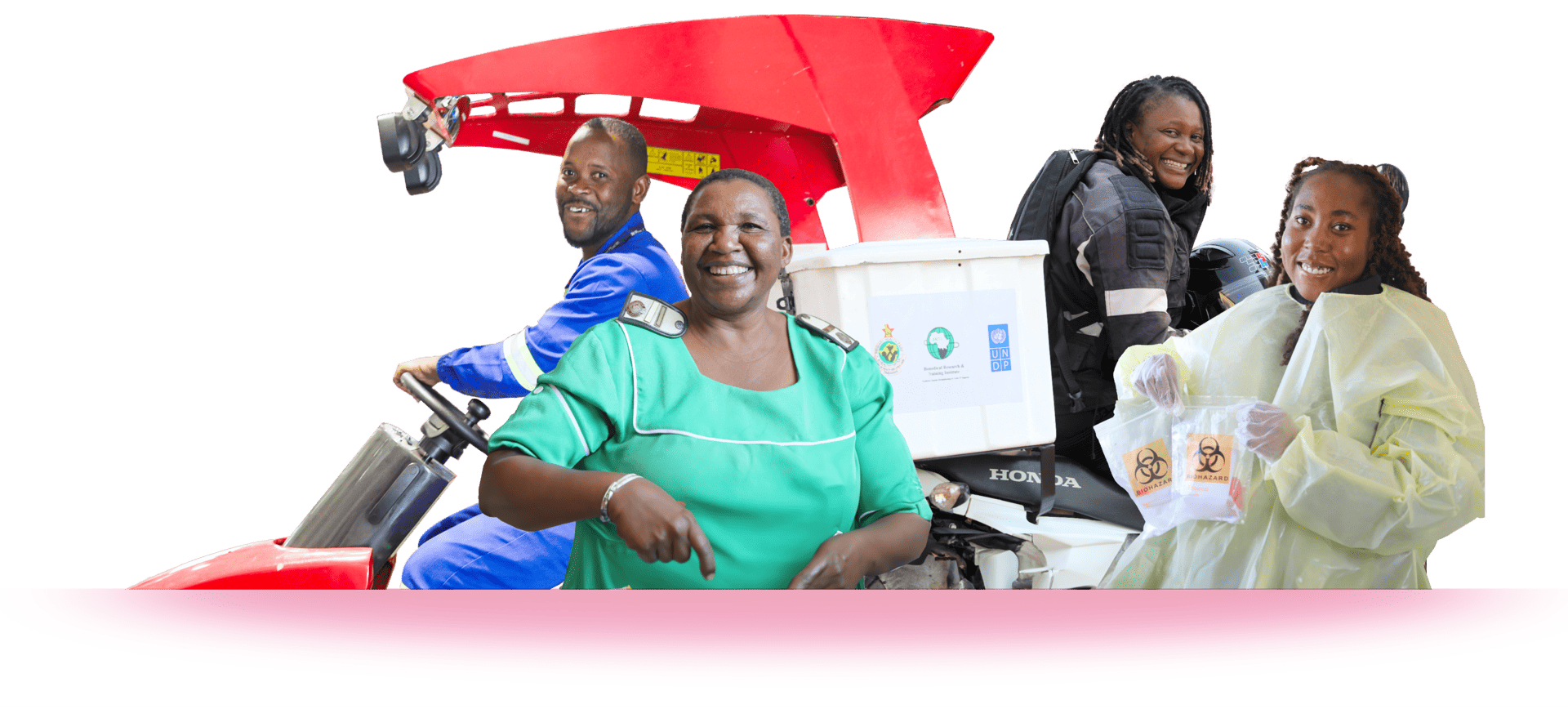
Invertir en las personas, las sociedades y las economías
Las convulsiones y la incertidumbre han detenido prácticamente los avances en la reducción mundial de la pobreza, y 1.100 millones de personas siguen viviendo en estas condiciones. Las tensiones económicas y el escaso margen fiscal han restringido la inversión en desarrollo sostenible. Los países en desarrollo destinaron la cifra récord de 1,4 billones de dólares al pago de su deuda externa en 2023. Aumenta la polarización en el seno de las sociedades, impulsada por la desinformación, que en 2024 fue calificada por primera vez como el principal riesgo mundial a corto plazo.
Junto con sus socios, el PNUD ayuda a los países a transformar estas dificultades en oportunidades de desarrollo en aras del avance de su ambición de establecer un futuro más justo y sostenible.
En 2024, el PNUD prestó apoyo a los países en las siguientes esferas [3]
 OBJETIVOS AMBICIOSOS EN MATERIA DE GOBERNANZA
OBJETIVOS AMBICIOSOS EN MATERIA DE GOBERNANZA
Objetivo para el período 2022-2025:
800 millones de votantes registrados para participar en procesos electorales
Situación en 2024:
816,2 millones de votantes registrados
recibieron apoyo en 57 elecciones en 43 países*
Contribución del PNUD a la participación electoral:
- 2022: 110,7 millones de votantes registrados (14 elecciones)
- 2023: 328,4 millones de votantes registrados (22 elecciones)
- 2024: 377,1 millones de votantes registrados (23 elecciones)
* Los datos se refieren al período comprendido entre 2022 y 2024.
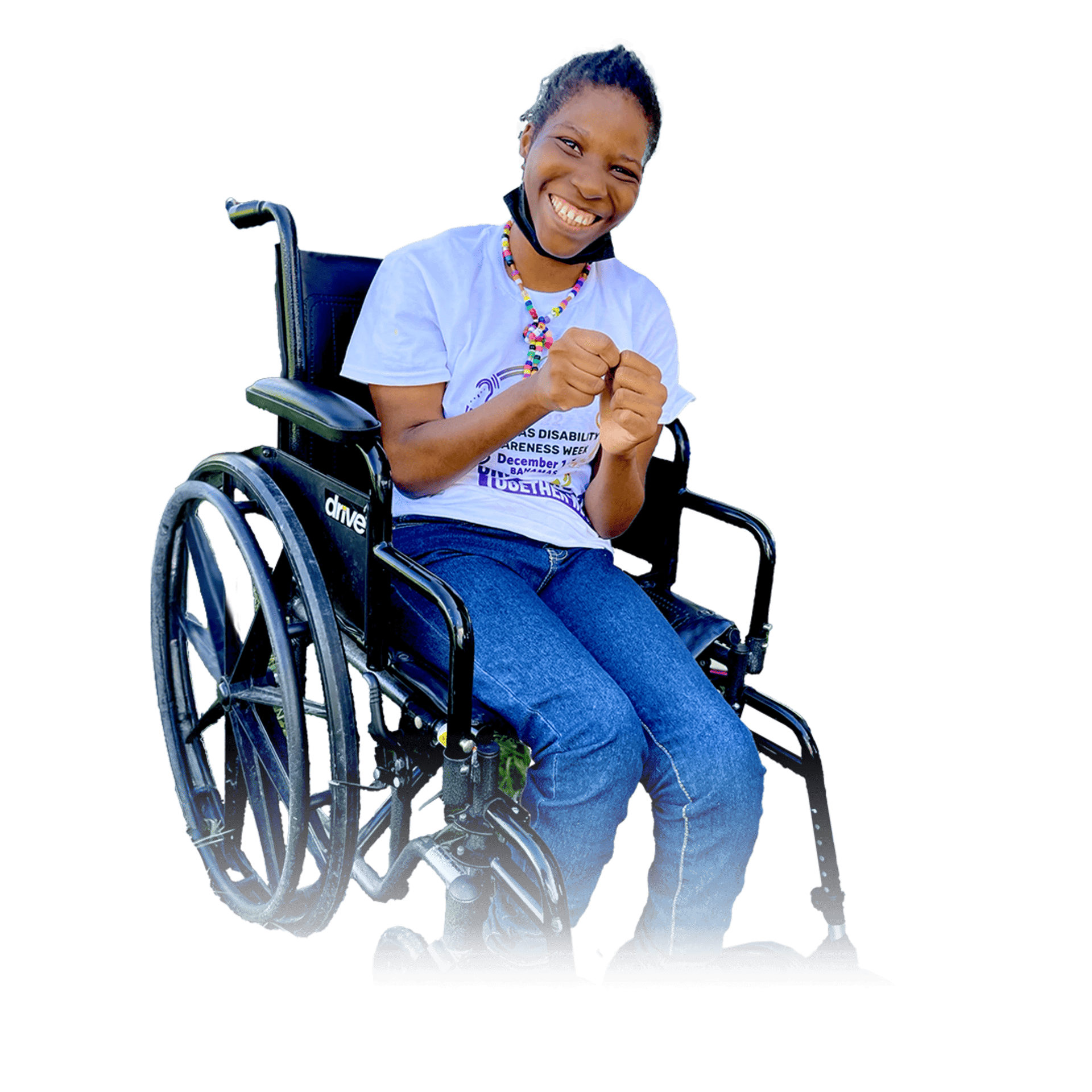
MÁS QUE UNA APLICACIÓN MÓVIL
La digitalización desempeña un papel crucial en el avance de las capacidades y aspiraciones humanas. Apoyada por el PNUD, la aplicación móvil AccessAbility pone al alcance de las personas con discapacidad de las Bahamas información y servicios antes inaccesibles. Ello incluye oportunidades de empleo, servicios de respuesta y rescate en caso de desastres y, en breve, una función de reserva de vehículos accesibles. Al analizar las tendencias y los datos de los usuarios, los responsables políticos pueden tomar decisiones sobre una base más empírica para mejorar la vida de los más desfavorecidos. Más de 2.000 personas se han inscrito ya en la aplicación.
Foto: PNUD / MCO Jamaica.

HACER QUE CADA VOZ CUENTE
Alima es una activista social y podcaster que colabora con el PNUD para ayudar a las jóvenes de Mozambique a reconocer la importancia de su voto. Las mujeres representan el 53 % del electorado, pero su participación sigue siendo baja. Para hacer frente a esta situación, el PNUD trabajó con el organismo de gestión electoral, la Comisión Electoral Nacional y ONU-Mujeres para crear campañas nacionales de comunicación.
Foto: PNUD / Cynthia Matonhodze
ODS apoyados a través de las iniciativas para lograr objetivos ambiciosos en materia de pobreza y gobernanza del PNUD


















El PNUD apoyó a Nepal en la ampliación de los servicios legales a los 77 distritos , distritos del país, brindó asistencia jurídica a más de 250.000 personas y contribuyó a la aprobación de una legislación sobre asistencia legal.
Un planeta
sano para un futuro sano.
 OBJETIVOS AMBICIOSOS EN MATERIA DE ENERGIA
OBJETIVOS AMBICIOSOS EN MATERIA DE ENERGIA
Objetivo para el período 2022-2025:
500 millones más de personas que disfrutan de energía limpia
Situación en 2024:
hasta
177 millones de beneficiarios (directos e indirectos)*
desde 2022, el PNUD ha prestado apoyo directo a 128 países:
- 50,7 millones de personas gozan de acceso a energías renovables
- 26,1 millones de personas hacen un uso productivo de la energía (salud, agua, agricultura, infraestructuras y transporte)
- 100 millones de beneficiarios indirectos(a través de marcos políticos y normativos, desarrollo de mercados y desarrollo de capacidades)
- 383 proyectos relacionados con la energía
CAFÉ CON BENEFICIOS
En asociación con Lavazza, el PNUD brinda apoyo a agricultores ecuatorianos en las inmediaciones de la selva amazónica para que produzcan el primer café certificado libre de deforestación del mundo. La iniciativa cuenta con el respaldo del Fondo Verde para el Clima y ONU-REDD y forma parte del programa PROAmazonía del Ecuador, cuyo objetivo es restaurar más de 15.000 hectáreas de tierras. El proyecto beneficia a 70.000 agricultores locales, el 40 % de los cuales son mujeres, al ofrecer precios más altos por el café sostenible, que Lavazza lanzará a escala internacional.
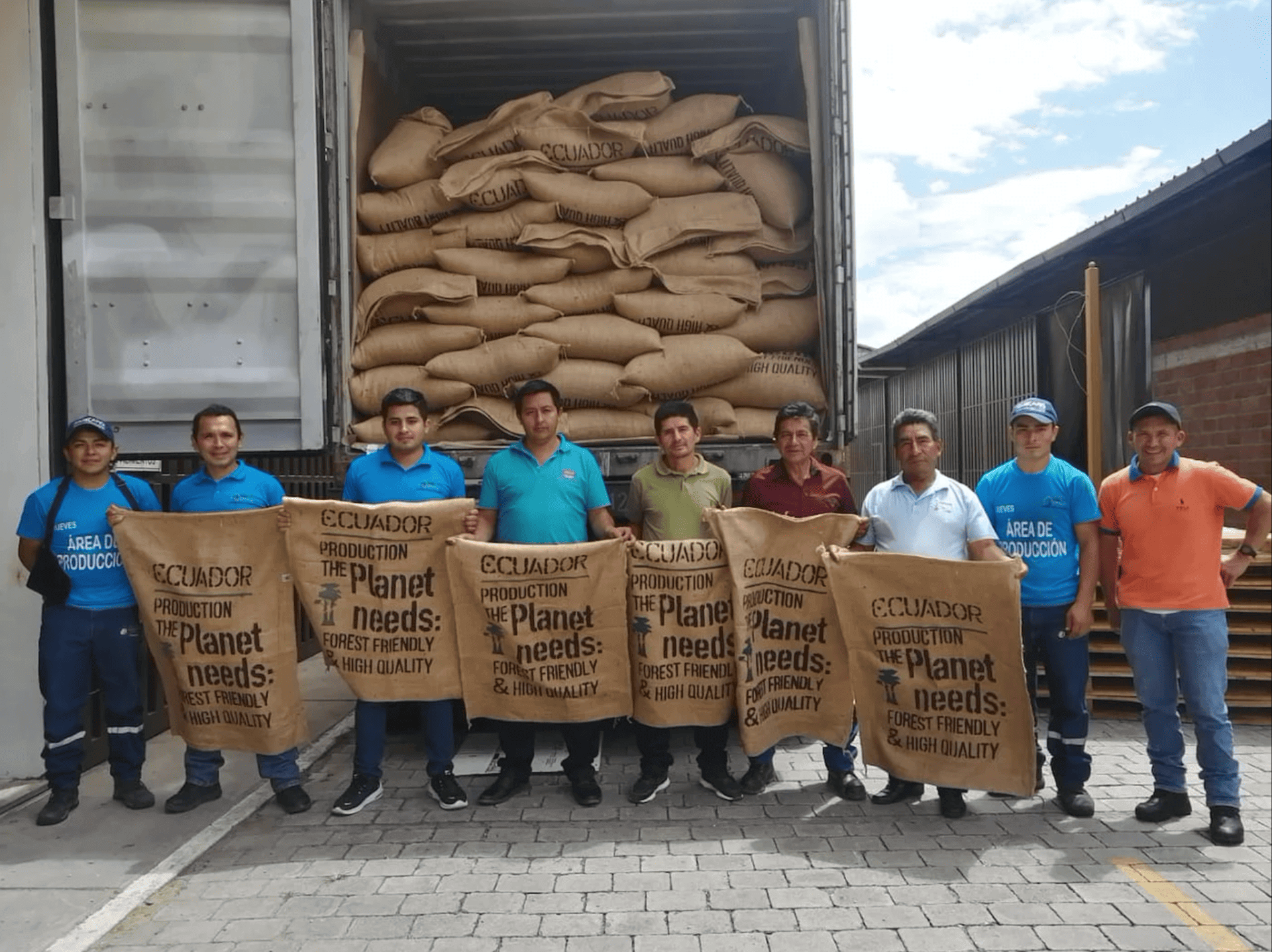
Foto: PNUD Ecuador

Invertir en clima, energía y medio ambiente
Durante 2024, el año más caluroso jamás registrado, ni la emergencia climática mundial ni los desastres naturales dieron tregua. Al mismo tiempo, el déficit anual de financiación para el clima, que se estima en 2,7 billones de dólares de aquí a 2030, limita en gran medida la capacidad de los países y las comunidades, en especial de los más vulnerables, para invertir en acción climática y adaptarse a los devastadores efectos del cambio climático.
El PNUD ayuda a los países a combinar la acción climática con la conservación de la biodiversidad y los ODS con el fin de maximizar los resultados socios al desarrollo por el bien de las personas y el planeta.
En 2024, el PNUD apoyó a los países en las siguientes esferas[5]:
Apoyo a los ODS a través de la iniciativa del PNUD para lograr objetivos ambiciosos en materia de energía









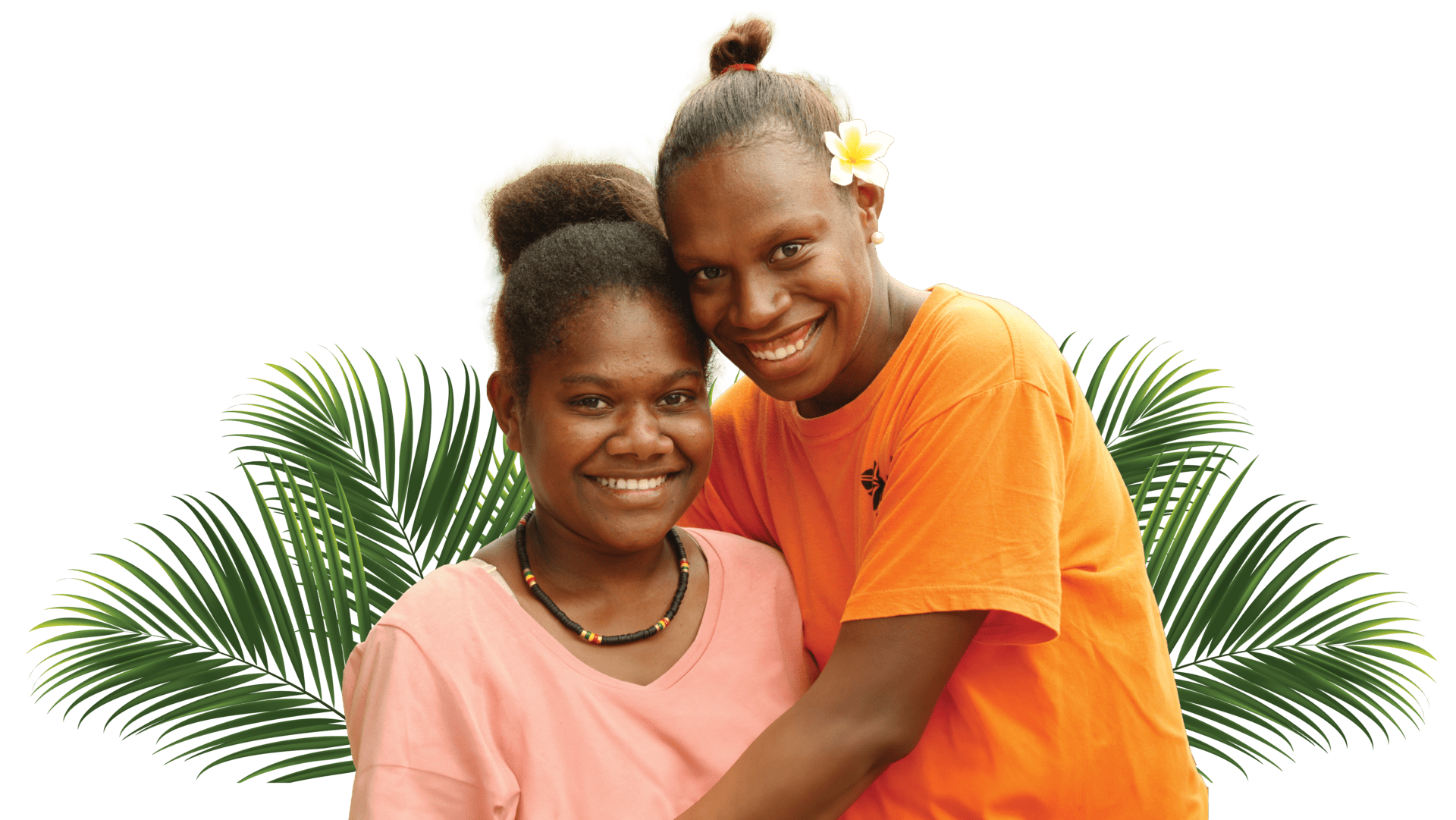
FOMENTAR LA PROSPERIDAD MEDIANTE LAS ENERGÍAS RENOVABLES
En Vanuatu, cuya población de 300.000 habitantes está repartida en 83 islas del Pacífico, el 30 % de los hogares carece aún de acceso a la electricidad. El apoyo del PNUD a las minirredes híbridas de energía solar e hidroeléctrica en Loltong está transformando los medios de subsistencia al proporcionar energía fiable a hogares, escuelas, clínicas y empresas, como las empresas pesqueras. Esta clase de iniciativas promueven el desarrollo sostenible, el crecimiento económico y la acción por el clima, al tiempo que empoderan a las comunidades locales para que gestionen y mantengan sus sistemas energéticos. Foto: Oficina del PNUD en el Pacífico / Idiko Hamos
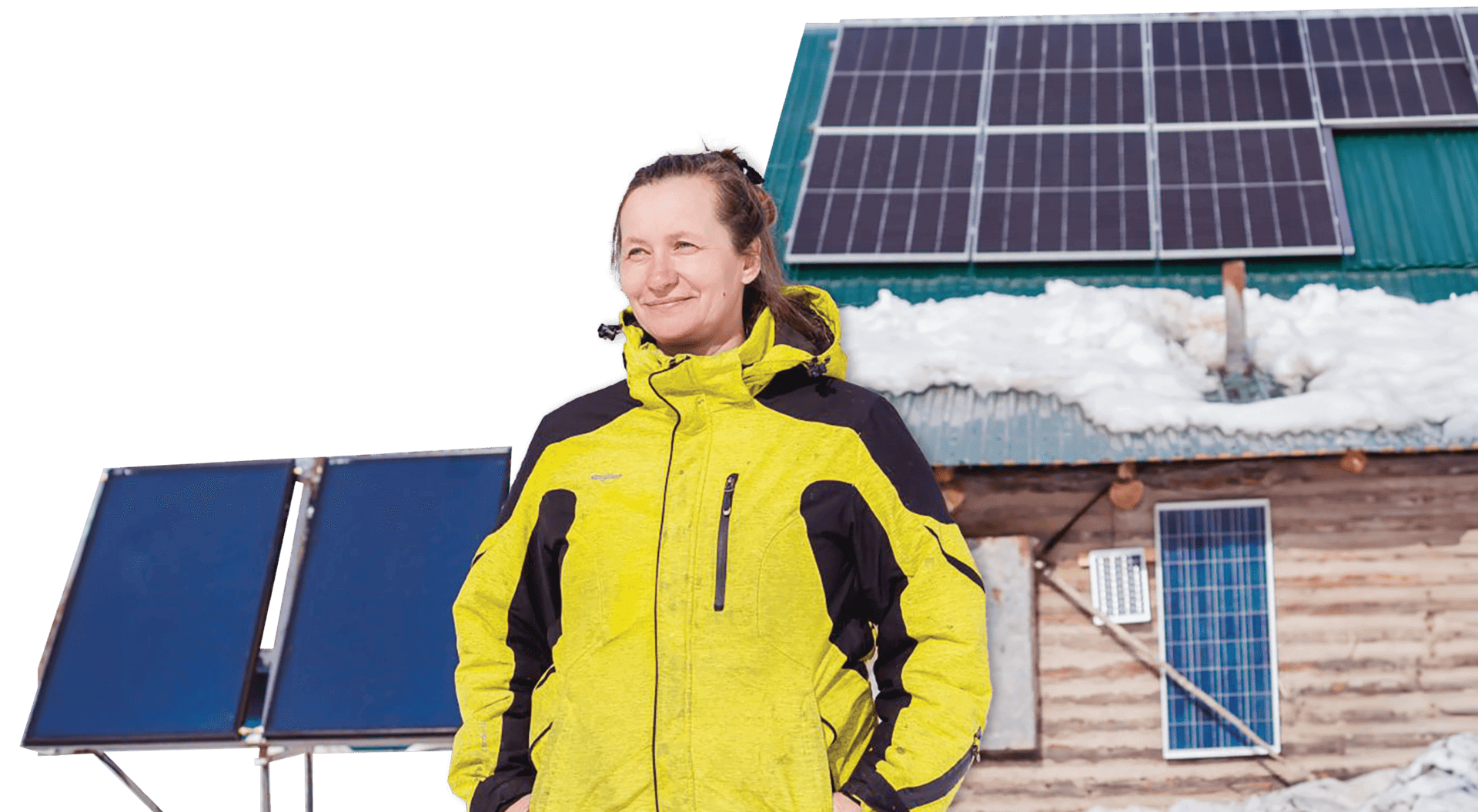
SISTEMAS DE ALERTA TEMPRANA: MÁS INTELIGENTES Y EXTENSOS
El cambio climático está provocando más fenómenos meteorológicos extremos en Asia Central, como corrimientos de tierras, inundaciones, sequías e inseguridad alimentaria. Los sistemas de alerta temprana son cruciales para salvar vidas y reducir pérdidas económicas. El PNUD está potenciando la resiliencia en la región aportando conocimientos técnicos y recursos para poner en marcha sistemas de alerta temprana a gran escala en Kazajstán, Kirguistán, Tayikistán y Uzbekistán. Mediante una combinación de iniciativas, estos esfuerzos buscan mejorar la preparación, salvaguardar los medios de subsistencia y reforzar la resiliencia ante los peligros inducidos por el clima. Foto: PNUD Kazajstán
¿Qué piden las personas con respecto al clima? Actuar ya
En 2024, el PNUD se asoció con la Universidad de Oxford para llevar a cabo la encuesta Voto Popular por el Clima. Con una cobertura que se extiende a 77 países y el 87 % de la población mundial, fue la mayor encuesta de opinión pública sobre el cambio climático jamás realizada.
¿Qué hemos aprendido de ella?
Movilizar la financiación: una inversión en nuestro futuro
El PNUD es el mayor socio en la ejecución de dos importantes fondos multilaterales para la naturaleza y el clima: el Fondo para el Medio Ambiente Mundial y el Fondo Verde para el Clima. El PNUD ha canalizado más de 10.000 millones de dólares de ambos fondos en apoyo de los países, y se espera obtener otros 39.000 millones en cofinanciación.
Entre 2017 y 2024, a través del Programa de Pequeñas Donaciones del Fondo para el Medio Ambiente Mundial, más de 800 millones de dólares han financiado casi 30.000 microproyectos, entre ellos, más de 2.630 proyectos encabezados por mujeres. Estos proyectos proporcionan protección medioambiental y mejores medios de subsistencia, principalmente para las comunidades locales e indígenas.
En colaboración con la Unión Europea y otros socios, el PNUD ha transformado la financiación de la biodiversidad. Desde 2012, la iniciativa BIOFIN ha crecido hasta convertirse en un programa de 200 millones de dólares respaldado por 10 donantes y que abarca 133 países. Ha movilizado 1.600 millones de dólares destinados a una nueva financiación de la biodiversidad, al tiempo que ha ayudado a reformar o rediseñar subvenciones por valor de 1.000 millones de dólares que antes eran perjudiciales para la naturaleza.
Resiliencia
en todos los sentidos.
Invertir en resiliencia favorece el desarrollo
Los conflictos violentos y las catástrofes siguen aumentando en frecuencia e impacto, cobrándose vidas y poniendo en peligro los logros en materia de desarrollo.
El PNUD trabaja sobre el terreno antes, durante y después de las crisis. Gracias a nuestra presencia en 170 países y territorios, ayudamos a prevenir crisis, responder rápidamente a ellas y contribuir a la recuperación a largo plazo tendiendo puentes entre la ayuda humanitaria, la consolidación de la paz y la ayuda al desarrollo.

En 2024, cerca del 50 % de nuestro gasto se destinó a contextos frágiles. El PNUD y sus socios brindan ayuda a países y comunidades para lograr los siguientes objetivos[7]:
- Prevenir y mitigar los riesgos de crisis: el Risk Anticipation Hub del PNUD proporciona datos y análisis en más de 30 países para fundamentar una toma de decisiones rápida y eficaz sobre acciones preventivas para mitigar los riesgos de crisis. En Benin, Côte d'Ivoire, Ghana y Togo, colaboramos con las autoridades nacionales y agentes locales para establecer 38 mecanismos de alerta y respuesta tempranas con el fin de subsanar las causas profundas del extremismo violento. Durante la transición en Haití, el PNUD continúa siendo un socio clave de la Policía Nacional y del Consejo Electoral Provisional para reforzar la seguridad en preparación para unas elecciones seguras e inclusivas. También ayudamos a los países a mitigar los riesgos de catástrofe a través de nuestra cartera, dotada con 800 millones de dólares, que da apoyo a sistemas de información y alerta temprana sobre el clima. A través del mecanismo de financiación Systemic Observations Financing Facility, cofundado con socios de las Naciones Unidas, el PNUD apoya a 60 países en la mejora de los datos sobre la climatología y el clima. Somos uno de los principales socios de la iniciativa Alertas Tempranas para Todos las Personas, lanzada por el Secretario General de las Naciones Unidas para velar por que todos los habitantes de la Tierra estén protegidos frente a fenómenos meteorológicos peligrosos mediante sistemas de alerta temprana para 2027. El PNUD ha movilizado una cantidad inicial de 1,3 millones de dólares del Fondo Verde para el Clima y movilizará otro 157 millones adicionales destinados a siete países en desarrollo.
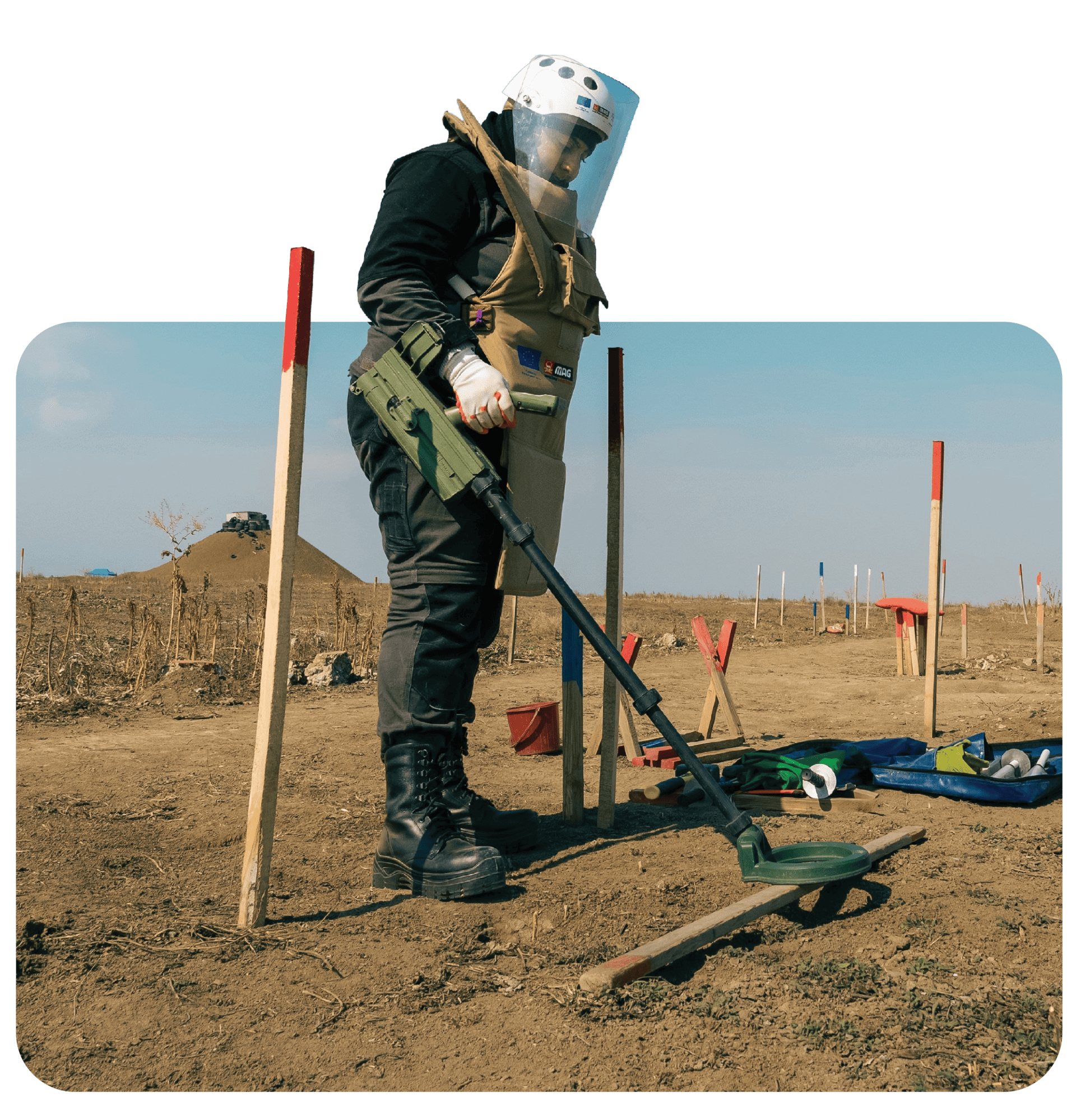
LA CONTRATACIÓN DE MUJERES, CLAVE EN LA ACCIÓN CONTRA LAS MINAS
Limpiar la tierra de minas y artefactos explosivos permite a las personas desplazadas regresar a sus hogares y granjas y reconstruir su vida cotidiana, al tiempo que alienta a los países a planificar y progresar. En Azerbaiyán, las mujeres limpian por primera vez tierras contaminadas tras completar un programa de formación respaldado por el PNUD. Involucrar a las mujeres les proporciona medios de subsistencia y voz en la forma en que se lleva a cabo el trabajo. Foto: PNUD Azerbaiyán
El PNUD "permanece y cumple" para promover la autonomía de las mujeres
En 2024, el 70 % de los recursos del PNUD en contextos frágiles se destinaron a iniciativas cuyo principio o objetivo importante es la igualdad de género. Por ejemplo:
- Nos asociamos con organizaciones dirigidas por mujeres y otros actores de la sociedad civil en Gaza para proporcionar asistencia jurídica de emergencia con perspectiva de género a 5.000 personas.
- La Plataforma de justicia de género del PNUD y ONU Mujeres, presente en 37 países, amplió el acceso a la justicia para mujeres supervivientes de violencia sexual relacionada con conflictos en Colombia, Etiopía, Sudán del Sur y Ucrania.
- En Siria, el PNUD brindó apoyo laboral a más de 15.000 mujeres, fortaleció la capacidad de 22 organizaciones dirigidas por mujeres y creó cinco Centros de Seguridad para Mujeres que atendieron a cerca de 19.000 mujeres y niñas.
El desarrollo ayuda a las comunidades y a los excombatientes a volver a casa y encontrar soluciones sostenibles
Entre 2022 y 2024, 19,2 millones de personas se beneficiaron de la labor del PNUD en materia de desplazamiento forzado.
Como miembro del Grupo directivo sobre Soluciones a los Desplazamientos Internos de las Naciones Unidas, el PNUD colabora con 15 países en la búsqueda de soluciones duraderas para que las personas puedan regresar a sus hogares o integrarse de forma sostenible en las comunidades de acogida o en otros lugares dentro de sus países. Los gobiernos de la República Centroafricana, Colombia, Etiopía, el Iraq, Mozambique, Nigeria y Somalia se han comprometido colectivamente a impulsar el desarrollo humano de 11 millones de desplazados internos, miembros de las comunidades de acogida y retornados.
El PNUD también apoya las estrategias de desarme y reintegración. En Etiopía, el PNUD colabora con las autoridades regionales, los socios de las Naciones Unidas y la sociedad civil para ayudar a la Comisión Nacional de Rehabilitación a desmovilizar y reintegrar a 372.000 excombatientes durante los próximos dos años. El programa ofrece apoyo psicosocial, educación cívica y pequeñas subvenciones para promover la reintegración en la comunidad, al tiempo que proporciona prótesis a excombatientes con discapacidad. A principios de 2025, el programa se amplió: pasó de cubrir una sola región a cubrir cuatro.

RECONSTRUIR VIDAS TRAS EL CONFLICTO
Una piedra angular de los esfuerzos del PNUD son sus 60 años de colaboración con la agencia de las Naciones Unidas para los refugiados, el ACNUR. Esta labor, en colaboración con otros socios, ha incluido el apoyo a los gobiernos que acogen a personas refugiadas sirias, lo que ha permitido crear más de 500.000 puestos de trabajo para personas refugiadas y miembros de las comunidades de acogida. Foto: PNUD Líbano
RESOLVER EL DESPLAZAMIENTO FORZOSO
Con el apoyo del PNUD, los gobiernos de la cuenca del lago Chad han mejorado la seguridad, el trabajo y las condiciones de vida, lo que ha permitido a 435.000 personas desplazadas regresar a sus hogares. Se trata de uno de los más de 100 proyectos similares en casi 50 oficinas en el país del PNUD. Foto: dpa / Alamy Live News
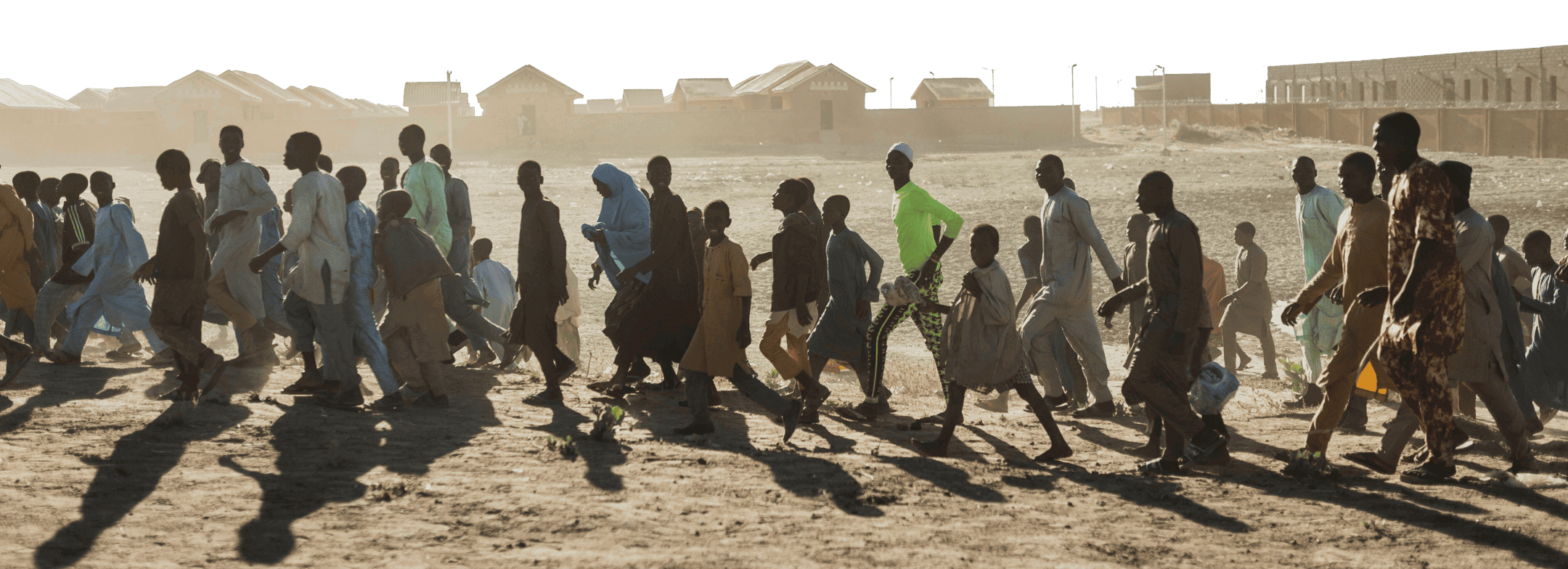
Acción
digital.
Invertir en tecnologías digitales podría repercutir en el 70 % de las metas de los ODS
La digitalización y la inteligencia artificial pueden tanto acelerar como obstaculizar el desarrollo. Los países en desarrollo son el punto de origen de profundas innovaciones tecnológicas. Sin embargo, aunque la inteligencia artificial podría generar unos beneficios económicos estimados en 15,7 billones de dólares de aquí a 2030[8], esta cifra se producirá principalmente en los países desarrollados y en China. Solo alrededor del 10 % de los beneficios llegarán a los países del sur global, lo que amenaza con agravar las desigualdades existentes.
El PNUD ayuda a los países a crear un futuro digital seguro para todas las personas a fin de que la transformación digital sea una fuerza que empodere a las personas y el planeta.
Leer másNúmero de personas conectadas a Internet:
5.500 millones

A LA VANGUARDIA DE LA INTELIGENCIA ARIFICIAL RESPONSABLE
El PNUD y sus socios dan prioridad a los países en desarrollo y las economías emergentes en un esfuerzo colectivo mundial destinado a aprovechar la inteligencia artificial en beneficio del desarrollo sostenible, a fin de colmar las brechas digitales e impulsar los objetivos internacionales de desarrollo.
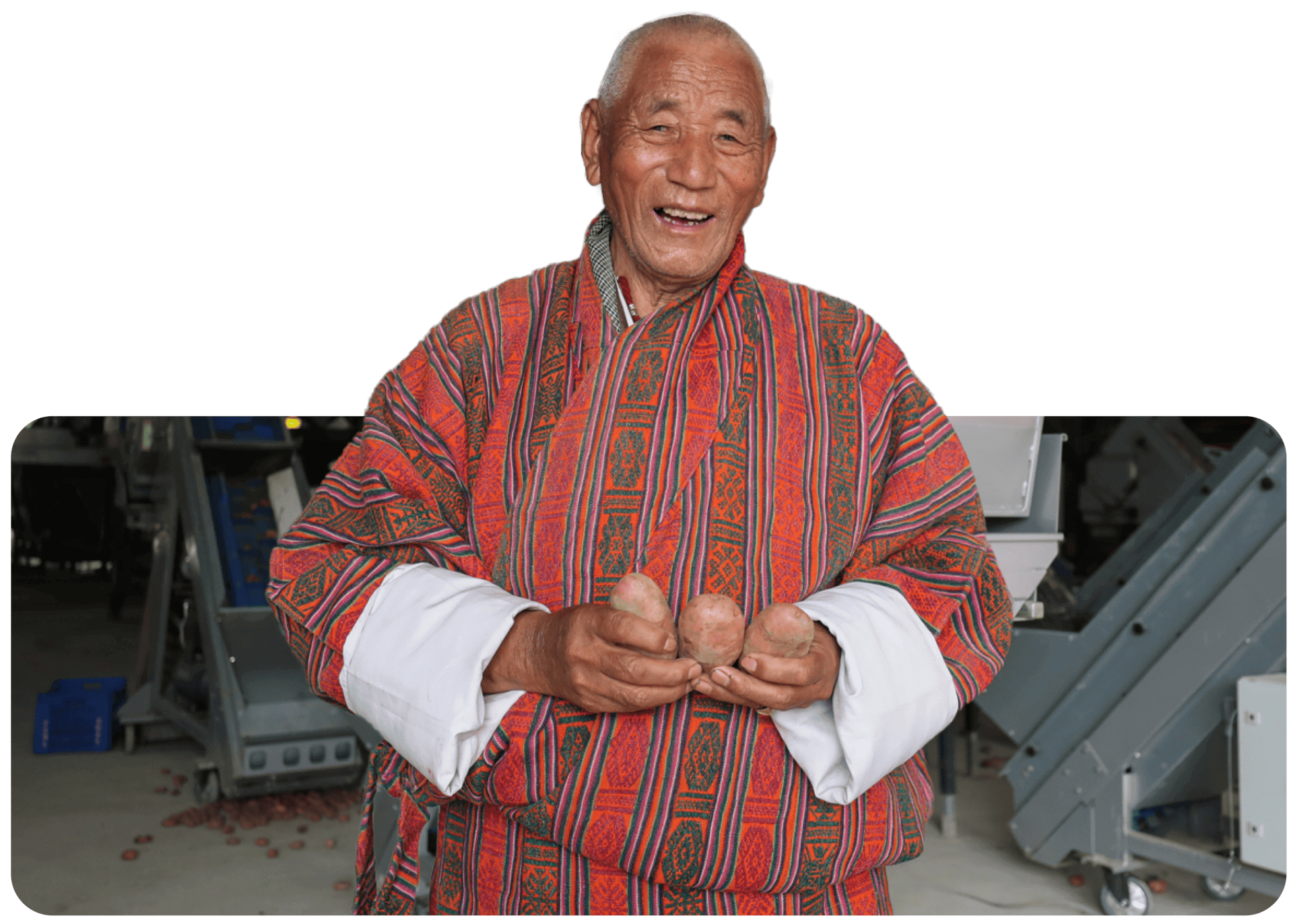
LAS SUBASTAS EN LÍNEA TRANSFORMAN EL SECTOR
Golley es uno de las cientas de personas que cultivan patatas en el centro de Bhután ahorrando tiempo y dinero gracias a un nuevo sistema digital de subastas que forma parte de un centro de vanguardia establecido por la Food Corporation of Bhután Ltd. con el apoyo del fondo fiduciario para los países menos adelantados del Fondo para el Medio Ambiente Mundial, el PNUD y la Organización de las Naciones Unidas para la Alimentación y la Agricultura (FAO). Foto: PNUD Bhután / Karma Jamtsho

 English
English
